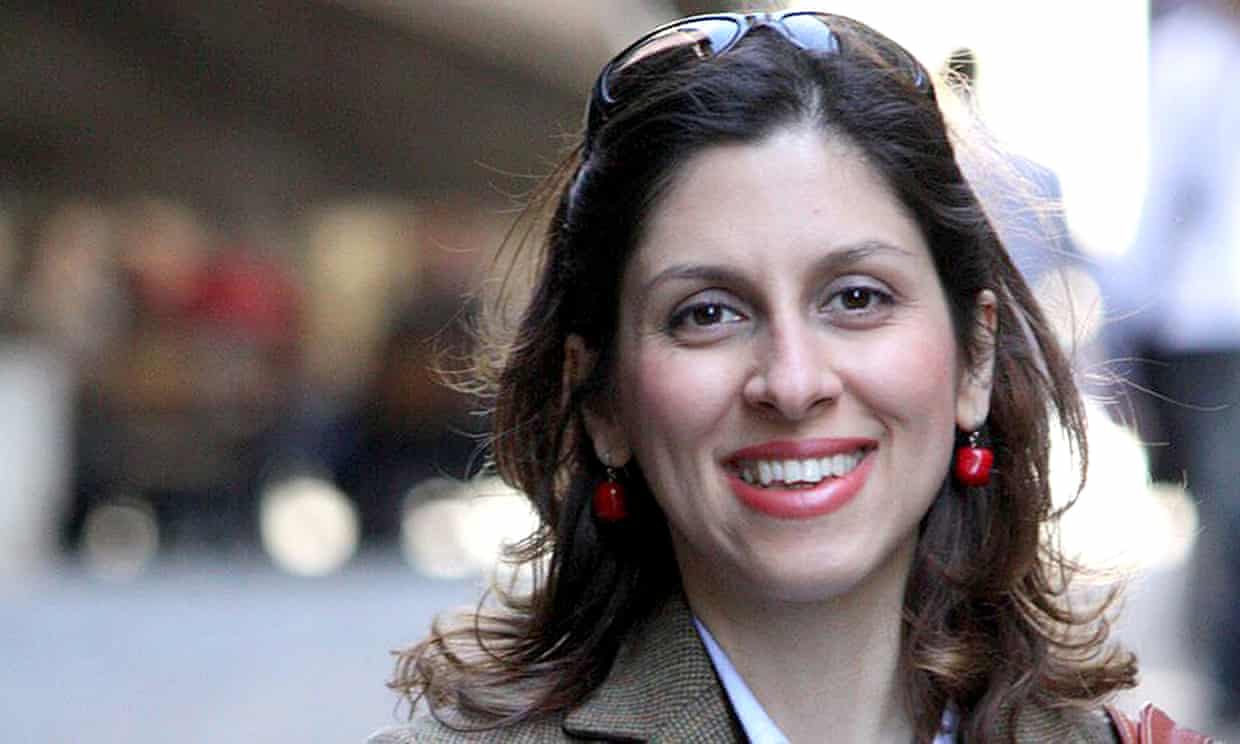
Johnson 'did not keep word' to free Nazanin Zaghari-Ratcliffe
by Patrick WintourOther dual nationals also in jail because of UK failure to repay debt to Iran, says husband
Boris Johnson made only “placebo promises” to free Nazanin Zaghari-Ratcliffe and is responsible for putting more British-Iranian dual nationals in the jails in Iran, her husband, Richard Ratcliffe, claims in a private letter to the prime minister.
Ratcliffe sent the letter 100 days ago, seeking a meeting alongside his daughter, Gabriella, to discuss his wife’s three-and-a-half-year imprisonment.
He received nothing more than an acknowledgement from Downing Street, and has now released its content.
In the letter, Johnson and his allies are accused of trying to defend his own political reputation “by muddying the waters around his wife’s case. The deflections informed months of propaganda, broadcast on Iranian TV for Nazanin to see from the walls of her cell.”
Ratcliffe demands to know why, as foreign secretary, Johnson did not follow through on a promise briefed to the rightwing press in 2017 that he would find a way to repay the £400m debt that the UK government acknowledges it owes from an arms deal struck with Iran in 1975. The repayment is widely seen as the single biggest cause of Zaghari-Ratcliffe’s prolonged imprisonment.

Ratcliffe wrote: “It remains unclear why you did not keep your word when foreign secretary, or why you briefed the newspapers if you had no intention of acting. Given the events subsequently, it remains unclear why you are yet to act on your promise now with the authority of a PM, or at least to meet and explain. The word of a foreign secretary cannot be easily undone, especially when [you] become PM.
“I told the FCO [Foreign and Commonwealth Office] privately that I thought your actions directly led to the imprisonment of other British Iranians, that there are people in prison now who would not be there if you had not made such promises and failed to keep them.”
“Of course, politics is full of placebo promises. But promises made lightly by politicians can still weigh heavy on the shoulders of others,” Ratcliffe continued.
“Since we last met, Nazanin has been on two hunger strikes and has been admitted to a psychiatric hospital in chains. That second court case against her has been revived. She is explicitly linked to the UK’s debt case, even by the Iranian foreign minister, [Mohammad] Javad Zarif, at the UN a few weeks ago.
“Similarly, other British Iranians have been arrested and sentenced, particularly in spring 2018 and again this summer. Developments in their cases have also been aligned to the UK’s debt court process and its continued stalemate. The UK now has more prisoners held in Evin prison than any of its allies.”
In the Tory leadership debates, Johnson said his mistake, in telling MPs that Zaghari-Ratcliffe had been training journalists in Tehran in 2017, had had no consequences, Ratcliffe wrote. “Plainly, that was false. Your allies went further on the airwaves, claiming that those who sought to blame you were apologists for the Iranian regime.
“Sleeping hungry on the street, I took issue with your refusal to accept your share of responsibility for Nazanin’s suffering.
“Oddly you are yet to correct your comments in Hansard, despite the comments being rolled out by Iran and used against Nazanin even now. At the time, we saw your cabinet allies being sent out onto the airwaves to dispute the slip’s severity, to muddy the waters around Nazanin’s case. I had to ask the government to remind the cabinet that you all knew she was just a mum on holiday being framed.”
He said Johnson told him after his visit to Tehran in December 2017 that his campaigning was damaging his wife’s case and he should be quiet for a few months.
Ratcliffe also accused some ministers of highlighting Nazanin’s status as a two-tier citizen in an attempt to show that the government owed them less responsibility to protect.
“By meeting, I would like you to affirm personally Nazanin’s importance and innocence, and your commitment to bringing Nazanin home. After the prevarications last time round, and especially the aloofness since, this has come under question. It is an important signal for us, for Iran, even for those of your supporters who periodically troll us. Nazanin matters still. Your word is your bond,” he wrote.
“Our story defines what a British passport is worth on your watch. The job of a PM is not just to make headlines, but in the end to make a difference. That starts with protecting citizens at their most vulnerable, home and abroad. Flowery promises do not keep people safe. In fact, undelivered they can have the opposite effect. Know that your actions cemented Nazanin’s place.
“Nazanin says how she no longer wants to live through what they are doing to her. Even if she knows her family is waiting, her ‘destiny does not allow’. Those in power do not care enough to solve it, and she cannot keep going like this. She has lost hope, lost everything, in bottomless waiting.”
A Conservative spokeswoman said: “The government remains extremely concerned about the welfare of British-Iranian dual nationals detained in Iran, including Mrs Zaghari-Ratcliffe. We continue to raise their cases at the most senior levels, and urge Iran to let them be reunited with their families.
“We are in regular contact with Mrs Zaghari-Ratcliffe’s family. The foreign secretary met Mrs Zaghari-Ratcliffe’s husband recently to reinforce the UK’s support for bringing his wife home.”
Amnesty International described Ratcliffe’s letter as harrowing adding: “This is an issue that transcends party politics, and we’d like to see the Prime Minister meet with Richard and Gabriella face-to-face as a matter of urgency, listen carefully to their concerns, and make it clear to them that the Government is prioritising their case.”